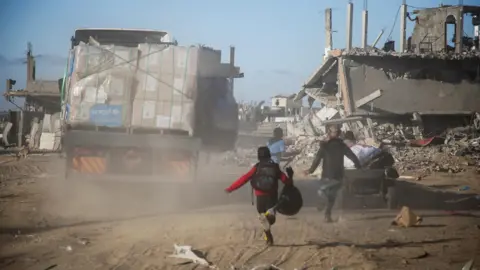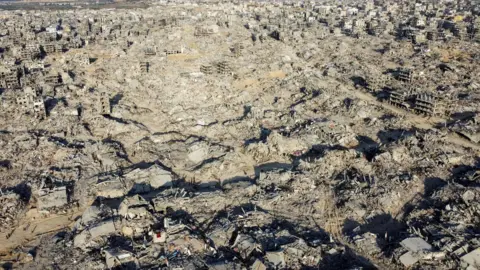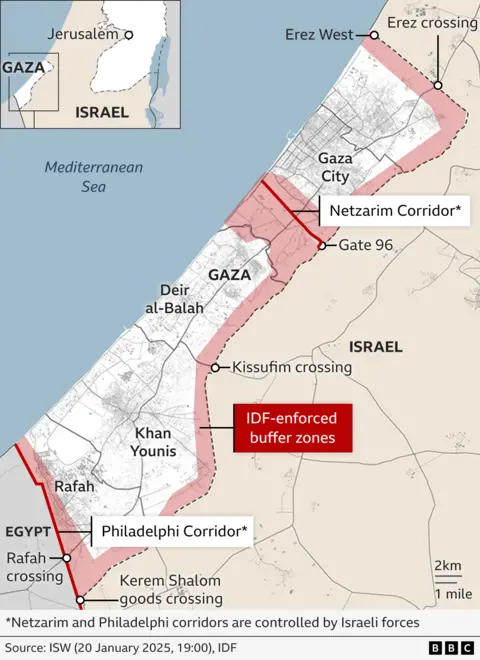UN official says rebuilding Gaza will take ‘long time’
 Reuters
ReutersA UN official in Gaza has warned that the reconstruction process in the devastated Palestinian territory will “take an awful lot of time” despite a huge increase in humanitarian supplies.
“We’re not just talking about food, healthcare, buildings, roads, infrastructure. We have individuals, families, communities that need to be rebuilt,” Sam Rose, acting director of the UN’s Palestine Refugee Agency, told the BBC.
After the ceasefire agreement between Israel and Hamas and the release of hostages came into effect on Sunday. The United Nations says at least 1,545 aid trucks have crossed into Gaza.
The trucks brought much-needed food, tents, blankets, mattresses, and clothing to those stranded outside Gaza during the winter months.
The first phase of the truce, which would allow 50 tankers of fuel to enter Gaza every day for six weeks, would require Hamas to release 33 Israelis in exchange for hundreds of Palestinian prisoners held in Israeli jails.
“We’re expecting a big change in the amount of aid that’s coming, and of course it’s going to be a lot easier for us to collect the aid because most of the problems we’ve had in the war will be eliminated when the war does. It’s going to stop,” Mr. Rose said.
“We are no longer operating in an active conflict zone. We do not need to coordinate all these activities with the Israeli authorities,” he added. “And today… we don’t have any major problems with robbery and crime.”
But “we must avoid thinking of the needs of the people in Gaza as the amount of aid,” he emphasized.
He added: “Everybody in Gaza is affected by what happened. Everybody has lost something. Most of the houses are now destroyed, most of the roads are now destroyed.” “It’s going to be a long, long process of recovery and reconstruction.”
WHO Regional Director Hanan Balki said Gaza’s health system has a 60-day plan to meet the urgent needs of the population and prioritize life-changing injuries for thousands of people.
The plan includes repairing Gaza’s hospitals – half of which are out of service and others partially functional – establishing temporary clinics in the worst-hit areas, addressing malnutrition and controlling disease outbreaks.
 Reuters
ReutersOn Sunday night, UN humanitarian chief Tom Fletcher warned that the humanitarian needs of Palestinians in Gaza were “staggering”.
United Nations officials have previously blamed the humanitarian crisis on the Israeli military’s use of aid, hostilities and the breakdown of law and order.
Israel has accused UN agencies of not distributing supplies, saying there is no limit to the amount of aid reaching Gaza and the rest of Gaza. He also accuses Hamas of stealing aid, which the group denies.
On October 7, 2023, an unprecedented cross-border attack left nearly 1,200 people dead and 251 hostages. Israel said that 91 of the hostages are still in custody.
Since then, more than 47,000 people have been killed and 111,000 injured in Gaza, according to the territory’s Hamas-run health ministry.
Most of Gaza’s 2.3 million people have been displaced several times, 60% of buildings are estimated to have been damaged or destroyed, health care, water, sanitation and hygiene systems have collapsed, and there are acute shortages of food, fuel, medicine and shelter.
In October, the United Nations-backed Integrated Food Security Classification (IPC) estimated that 1.84 million people across Gaza are experiencing severe food insecurity, and 133,000 people are at extreme levels of risk of disaster and starvation.
The following month, an IPC committee warned that famine was “imminent” in some parts of northern Gaza.
Before the ceasefire, the United Nations said the besieged northern towns of Jabalia, Beit Lahia and Beit Hanoun had been severely cut off from food aid since the Israeli army launched a ground offensive in October to prevent a resurgence by Hamas.
A Palestinian woman who returned to her destroyed home in northern Gaza on Monday after the ceasefire came into effect spoke of her shock after the withdrawal of Israeli troops.
Manal Abu al-Dragham told BBC Arabic’s Gaza Today programme: “The whole place was as if it had been hit by an earthquake from the severity of the attack.”
No matter what the cost, I will pitch my tent in the north… I don’t want to be displaced from my land anymore.

Mr. Rose said the Urwa groups in southern Gaza, where he is based, have not yet been able to cross into northern Gaza because the Israeli army has not opened roads through the east-west Netzarim corridor.
But as Urwa is the largest humanitarian organization in Gaza, networks and people on the ground can help them if they are given access, he said.
However, Urwa is facing Israeli restrictions that make it impossible to work in Gaza.
Two laws passed by Israel’s parliament that will take effect next week ban the agency from operating in Israeli territory and ban Israeli government agencies from dealing with it.
Israel has accused Urwan of collaborating with Hamas, and 18 of its employees were involved in the October 7 attack. The agency has fired nine staff members it said were involved in the UN investigation and has insisted on its neutrality.
The UN’s Urwa is irreplaceable in Gaza, the agency’s chief commissioner, Philippe Lazzarini, said, adding that thousands of Palestinian workers in Gaza will “stay and deliver” if the Israeli government enforces the two laws. A great personal risk to them.”








